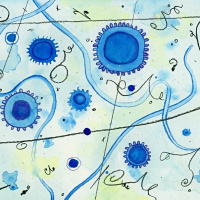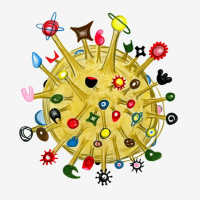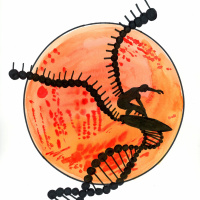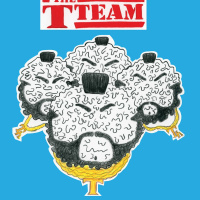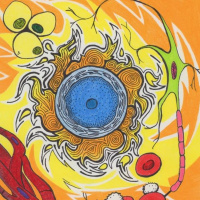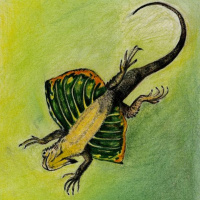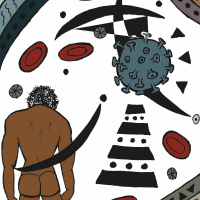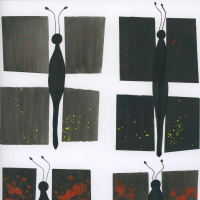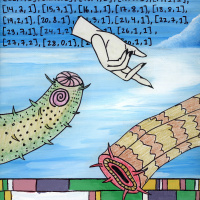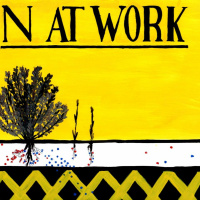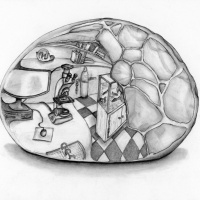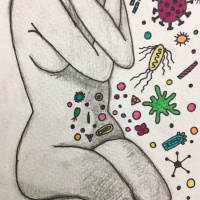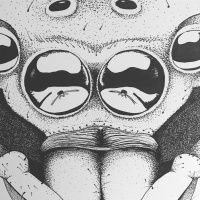Sinopsis
RadioBio is a podcast where UC Merced biology graduate students talk with seminar speakers for 30-45 minutes. Topics in biology will range widely, from molecules to ecosystems. Our target audience is anyone interested in science and biological research.
Episodios
-
RadioBio Interviews Dr. Tricia Van Laar
13/12/2018 Duración: 26minWe are all probably familiar with antibiotics, we have probably even taken them. Resistance to antibiotics have been in the news recently. But what is it? How does antibiotics resistance develop and are there ways to combat it? Dr. Tricia Van Laar chats with us and shares insights on antibiotic resistance.
-
RadioBio Interviews Dr. Alison Davis Rabosky
29/11/2018 Duración: 36minRed on yellow, kill a fellow. Red on black, friend of Jack. Some species use bright colors in different combinations to tell potential predators to back off, bub. Eat me and you'll be sorry. But not always.... Throughout the animal kingdom, species have evolved ways of faking out their enemies. Dr. Alison Davis Rabosky tells us about natures con artists, the mimics, and how these crafty creatures can actually drive evolution in their poisonous counterparts.
-
RadioBio Interviews Dr. Whendee Silver
15/11/2018 Duración: 25minWhen you think of ways to slow down climate change, what pops into your mind? Reduce, reuse, recycle!! Perhaps to never use fossil fuels again? These are things that we, as humans, can actively do to decrease our impact on earth's climate. We're not alone in the fight against climate change tho-- plants play an important role just by being, well, plants. This week on RadioBio, Dr. Silver from UC Berkeley tells us about how plants, together with soil microorganisms, help capture carbon from the atmosphere and store it in the ground; and what we can do to help.
-
RadioBio Interviews Dr. Sharon Strauss
01/11/2018 Duración: 23minDo you ever stop and smell the flowers? Do you feel like you only like certain kinds? Well, a bee would agree. Did you know scents are different because of species interactions? In a field of flowers, there are a lot of complex interactions at play that allow those flowers to coexist. But how does it all work? Today on RadioBio we talk with Dr. Sharon Strauss about the complexity behind species coexistence.
-
RadioBio interviews Dr. Jarmila Pittermann
18/10/2018 Duración: 30minExtreme drought is one of many impacts of climate change. Globally, we have seen droughts increase in duration and intensity, with many negative impacts on natural ecosystems, crops, and our economy. This begs the question - how do plants deal with drought? Our guest today, Dr. Jarmila Pittermann, studies plant ecophysiology — how plants are structured and what that structure means for how plants respond to their environment. She seeks to understand how different plants use different strategies for surviving drought by zooming in to look at their internal workings, their plumbing. Her exploration of the various systems plants have developed for moving and using water is showing us that some plants use some pretty unique methods for dealing with drought.
-
RadioBio Interviews Dr. Anita Sil
04/10/2018 Duración: 29minInfections occur when foreign invaders take root in the human body. When most people think of infections, they think of bacteria and viruses. These however, are not the only invaders our body has to watch out for - fungi are also able to cause disease in humans. You all may be familiar with mild fungal infections, such as athletes foot and yeast infections. Some fungi however can cause life threatening illnesses. One fungus, Histoplasma capsulatum, is capable of causing severe respiratory infections. Dr. Anita Sil from UCSF chat about how this fungus gets into our body and how we clear it.
-
Radiobio Dispatches: Vernal Pools
20/09/2018 Duración: 28minPresenting Radiobio’s first dispatch episode! This podcast focuses on the UC Merced Vernal Pools and Grassland Reserve featuring interviews from several scientists who do research on the reserve. Hydrologist Dr. Mark Rains, Herpetologist and conservation biologist Dr. Brad Shaffer, and fairy shrimp biologist Dr. Shannon Kiernan, and Reserve Director Monique Kolster. Discover what vernal pools are and what makes this ecosystem so special!
-
RadioBio Interviews Dr. Julie Zikherman
23/05/2018 Duración: 28minAutoimmune diseases occur when our immune systems start to attack our own cells, rather than foreign invaders. Unfortunately, very little is known about how these disorders arise in otherwise healthy individuals. Join us as we talk with B-cell immunologist and autoimmune clinician, Dr. Julie Zikherman, as we discuss how to control these inappropriate immune responses.
-
RadioBio Interviews Dr. Robert Phillips
09/05/2018 Duración: 29minGenetics is a majorly hot topic in biology right now -- everything is genome sequencing this, gene expression that -- but how much do we really know? We know a lot about which genes are present in which organisms, and what certain genes do, but not a lot about how or why they do it. Our guest today, Dr. Rob Philips, is a researcher at CalTech who is working to understand the language of gene regulation, and the methods we can use to understand how genes work.
-
RadioBio Interviews Dr. Ellen Rothenberg
25/04/2018 Duración: 38minWhenever you're sick, your immune system springs into action, but how? T-cells are like the generals of your immune system, and they command your immune system in battle against pathogens. Dr Rothenberg from @CalTech tells us all about this process and how these cells train into the powerful generals they are on this episode of RadioBio.
-
RadioBio Interviews Dr. Heinrich Jasper
11/04/2018 Duración: 22minDr. Heinrich Jasper shows us new tools using Stem Cells that can help with both our longevity as well as degenerative disease. The Jasper lab is focused on regulatory mechanisms that control stress tolerance, metabolism and aging with the help of fruit flies. In particular, Dr. Jasper has been recognized for making seminal discoveries about the effects of aging on stem cell behavior, and about the role of stress in regulating stem cell function. Current projects in his lab focus on the control of tissue regeneration, metabolic homeostasis, and cell death by insulin and stress signaling pathways. Here we learn how science moves from a bench in a lab at a school into an industrial clinical setting.
-
RadioBio Interviews Dr. Jim McGuire
28/03/2018 Duración: 31minTwo words: Flying Lizards. How'd it happen? Evolution. Evolutionary history is complicated. It can sometimes be helpful to look at funky animals to see what their unusual traits tell us about their history. For example, Dr. Jim McGuire from the University of California Berkley, studies the evolutionary correlates of size, color, and flight in lizards.
-
RadioBio Interviews Dr. Pleuni Pennings
14/03/2018 Duración: 23minViruses are iconically challenging to define, but they have DNA so they evolve. In the 1980s, the Human Immunodeficiency Virus (HIV) shook the world and propelled a massive undertaking to study the evolution of drug resistance in viruses. On world aids day, December 1st, 2017, we spoke with Dr. Pleuni Pennings from San Francisco State University about how viruses adapt to treatments through time.
-
RadioBio Interviews Dr. Adriana Briscoe
28/02/2018 Duración: 24minWe may not think about it this way, but there is a whole world of colors that we can not perceive or understand that other organisms use on a daily basis, like butterflies. Did you know that even males and females from the same species see the world differently? Today on RadioBio, Dr. Adriana Briscoe discusses the evolution of color vision in Heliconius butterflies using genes, physiology, and behavior.
-
RadioBio Interviews Dr. Joanna Chiu
14/02/2018 Duración: 32minHave you or someone you know been affected by sleep disorders, depression, or even drug or alcohol addiction. Believe it or not this may be linked to how and when you sleep...which is actually controlled by when you eat. Dr. Joanna Chiu, Professor of Entomology at UC Davis, studies the animal circadian clock and its control on organismal physiology. Besides being indispensable for the control of daily activities, defects in circadian rhythms and clock genes have also been implicated in a wide range of human disorders. The Chiu lab's goal is to dissect the molecular network and cellular mechanisms that control the circadian oscillator in animals, and investigate how this clock interacts with the environment and metabolism to drive rhythms of physiology and behavior.
-
RadioBio Interviews Dr. Bik
31/01/2018 Duración: 28minIf you've ever had a pet or known someone with a pet, you probably know what a round worm is, but did you know these are nematodes? 180 years of visualizing these fascinating worms gives us insight into biodiversity, evolution, and marine ecosystems. This week Dr. Holly Bik from the University of California, Riverside guides us through an exploration of these mysterious deep sea creatures using both ancient and novel techniques.
-
RadioBio Interviews Dr. John Stark
17/01/2018 Duración: 31minN at work. What is N? N, or nitrogen, is one of the most abundant gases in the atmosphere and is an elemental building block of life. But we can't use N from the atmosphere, we need help nitrogen fixing bacteria and plants to acquire N in a form we can use. Dr. John Stark from Utah State explains N, how it flows through natural ecosystems, and the organisms that make it work!
-
RadioBio Interviews Dr. Otger Campas
03/01/2018 Duración: 38minHow do cells interact with their physical environment? Dr. Otger Campas from the University of California, Santa Barbara joins RadioBio to discuss the physical properties of cells and how the interactions between cells and their environment shape cell and organism development.
-
RadioBio Interviews Dr. Embriette Hyde
20/12/2017 Duración: 25minYou may have heard about the human microbiome or even the pro-biotic fad, but how much do you really know about the micro-organisms that live on and in you? Dr. Embriette Hyde from UC San Diego discusses her work with the American Gut Project on understanding the world of human microbiome. This work could lead to advances in our understanding of both the human health and human disease.
-
RadioBio interviews Dr. Marie-Claire Chelini
06/12/2017 Duración: 24minHave you ever wondered why males and females of a species are different sizes, shapes, and colors? Dr. Marie-Claire Chelini, University of California Presidential Post-doctoral Fellow, discusses her research on the evolution of sexual size dimorphism in crab spiders.






